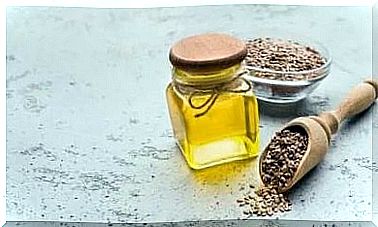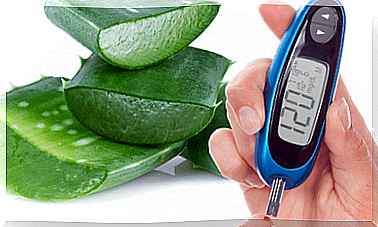What Are The Properties Of Apple Cider Vinegar?

The scientific literature supports many of the properties commonly attributed to apple cider vinegar. While it is true that many of its uses continue to be the result of rumors, there is now evidence regarding its nutritional content. Its anti-inflammatory and antimicrobial potential has been scientifically proven.
For starters, we must mention that this is a product obtained from the combination of apples and yeast. The latter ferments sugars and turns them into alcohol. Later, the bacteria turn the alcohol into acetic acid.
This process gives apple cider vinegar its sour taste and strong aroma and also seems to be responsible for its health benefits. Apple cider vinegar also contains water, traces of other acids, vitamins, minerals and other compounds that contribute greatly to well-being.
Properties of scientifically proven apple cider vinegar
Apple cider vinegar, like other types of vinegar, contains bioactive compounds with pharmacological potential. According to a review published in Food Chemistry, this product has high concentrations of polyphenols, organic acids and micronutrients. All these nutrients positively influence health when they are assimilated in the body.
Apple cider vinegar has antimicrobial, antioxidant, antidiabetic and antihypertensive properties. It is also positively associated with skin health and the prevention of premature aging.
Let’s take a closer look at the proven benefits of apple cider vinegar!

This substance is a disinfectant and a natural preservative due to its acetic acid content. Apple cider vinegar inhibits the growth of bacteria, such as E. Coli, which accelerates the breakdown of food and causes infections.
In a study published in 2018, researchers found that this vinegar has multiple antimicrobial properties. It fights pathogens such as E. coli, S. aureus and C. albicans. However, there is insufficient evidence to determine safe and effective doses.
One of the most popular benefits of apple cider vinegar is regulating blood glucose levels. This product is not a first-line treatment for diabetes, although its consumption in moderate amounts serves as an adjunct to glucose stabilization.
A small study published in Diabetes Care found that the intake of apple cider vinegar diluted in water can improve insulin sensitivity by 19% – 34%, especially after a meal rich in carbohydrates.
In a review published in Molecular Nutrition and Food Research, the researchers concluded that apple cider vinegar helps improve insulin function after meals. Therefore, apple cider vinegar lowers blood sugar levels.
Weight varies from person to person because it is determined by genetics and lifestyle. Apple cider vinegar can’t make you lose weight overnight. However, consuming it is helpful for those trying to shed pounds of fat.
Studies in humans suggest that moderate intake of apple cider vinegar increases satiety. As a result, caloric intake decreases and weight loss increases. In fact, research published in the Journal of the American Dietetic Association has found that ingesting vinegar after a high-carb meal increases the feeling of satiety. Also, the participants in the study consumed 200 – 275 fewer calories during the day.
Similarly, in a study published in Bioscience, Biotechnology, and Biochemistry , researchers found that daily intake of apple cider vinegar led to a reduction in abdominal fat.
In traditional medicine there is talk about the benefits of apple cider vinegar for cardiovascular health. In fact, some people believe that daily intake of apple cider vinegar lowers both cholesterol levels and the risk of heart disease. However, there is insufficient scientific evidence to that effect.
Animal studies have shown that this ingredient reduces cardiovascular risk factors, such as the accumulation of cholesterol and triglycerides in the blood. Apple cider vinegar also seems to be a good antihypertensive. Despite this, there is no solid data to confirm the same effects in humans.
However, as long as its consumption is moderate, you can include apple cider vinegar in a balanced diet. Consult your doctor if you are taking medication.
There is a lot of controversy about the application of apple cider vinegar on the skin. Some dermatologists wholeheartedly recommend its use. Others say it can go a long way in controlling the symptoms of eczema or dandruff when diluted in water.
How do we explain this?
Well, the skin is protected by an acidic mantle, and dryness and inflammation worsen when there is an imbalance in it. Organic vinegar helps restore the skin’s pH balance. But there is no scientific evidence to that effect.
In any case, always dilute this substance with water in equal parts to avoid unwanted effects. Ideally, do a small test on the back of your hand before applying the vinegar to another area of the body. If you notice an unwanted reaction, rinse your skin with plenty of water and stop using apple cider vinegar.

How to take advantage of the properties of apple cider vinegar
Just keep it in the kitchen and use it often. It is wonderful in salads, as an ingredient in homemade mayonnaise and in many other recipes. You can also dilute one or two teaspoons in a glass of warm water, which you drink every morning.
Avoid using undiluted apple cider vinegar, as it can damage tooth enamel and cause digestive discomfort. Its use is also contraindicated with certain medications. Consult your doctor if you are on medication.









